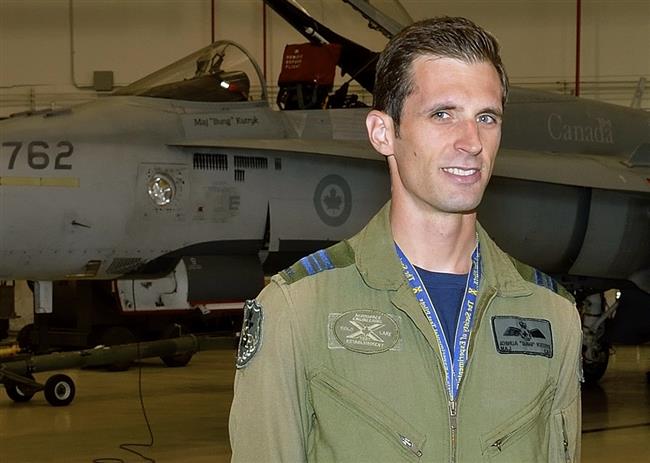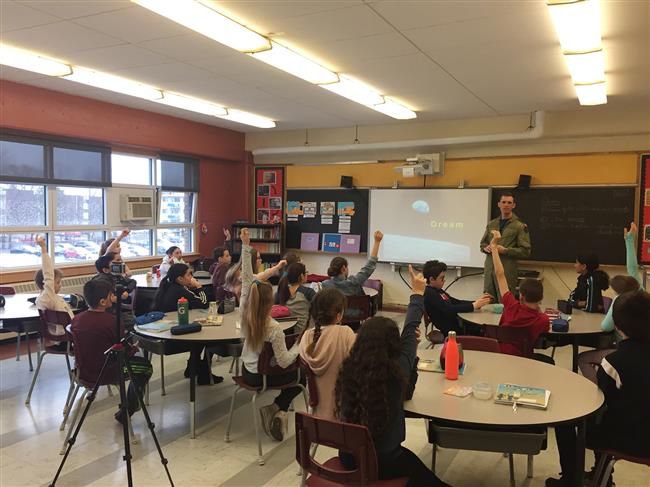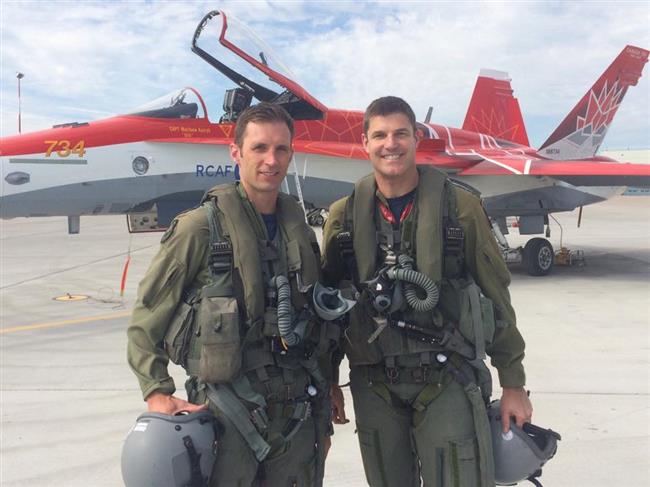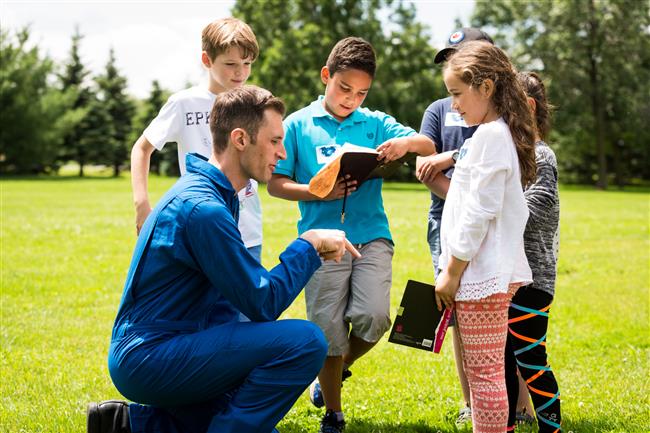Date of birth: March 21, 1982
Born: Fort Saskatchewan, Alberta, Canada
Pastimes: Backcountry skiing, cycling, mountaineering and paragliding
Background: Test pilot, fighter pilot, engineer, lieutenant-colonel in the Royal Canadian Air Force
Education: Bachelor in mechanical engineering; master in space studies; master in flight test engineering; master in defence studies
Flight certification: Airline Transport Pilot Licence (ATPL), fixed wing experimental test pilot, fighter pilot, civilian and military instructor pilot; 2,800 hours of flying experience on more than 25 aircraft types
Languages: English, French
Mission: Astronaut Candidate Training Program
- Personal Data: Born March 21, 1982, in Fort Saskatchewan, Alberta, Lieutenant-Colonel (LCol) Kutryk was raised on a cattle farm in eastern Alberta. He enjoys backcountry skiing, cycling, mountaineering and paragliding.
- Education: LCol Kutryk holds a bachelor’s degree in mechanical engineering (1st Class Distinction) from the Royal Military College of Canada in Kingston, Ontario (2004). He also earned a master’s degree in space studies from Embry-Riddle Aeronautical University in Florida (2009), a master’s degree in flight test engineering from the United States Air Force’s Air University in Alabama (2012), and a master’s degree in defence studies from the Royal Military College of Canada in Kingston, Ontario (2014).
- Organizations: Canadian Armed Forces, 2000 to present; Society of Experimental Test Pilots, 2015 to present.
- Special Honours: Governor General's Canadian Leadership Conference Delegate (2015), Liethen-Tittle Award for top test pilot graduate (2012), Distinguished graduate of the United States Air Force Test Pilot School (2012), Canadian Forces Decoration (2012), Article 5 NATO Medal (2011), Southwest Asia General Campaign Star (2010), Tristan de Koninck Trophy for F-18 flying skill (2007), City of Moose Jaw flying trophy (2006), A.C. Leonard Birchall Award for undergraduate research (2004), Top Overall Flying Proficiency during primary flight training (2003), Professional Engineers of Ontario Undergraduate Academic Scholarship (2002), Right Honourable Don Mazankowski Scholarship (2001), Governor General's Academic Medal (2000), Neil Armstrong Memorial Scholarship (2000), Alexander Rutherford Scholarship for Academic Achievement (1999).
Experience:
Prior to joining the Canadian Space Program, LCol Kutryk worked as an experimental test pilot and a fighter pilot in Cold Lake, Alberta, where he led the unit responsible for the operational flight-testing of fighter aircraft in Canada.

Prior to joining the Canadian Space Program, Joshua Kutryk worked as an experimental test pilot and a fighter pilot. (Credit: Royal Canadian Air Force)
As the officer in charge of fighter evaluations, he was responsible for safely conducting the initial airborne evaluations of new technologies and systems on the CF-18. He worked with a team of aerospace engineers, analysts, aircraft technicians and program managers in order to make the CF-18 safer and more effective in its mission. LCol Kutryk has worked on a variety of technical flight test projects, ranging from out-of-control flying to automated navigation and flight control systems to weapon guidance and control. In addition, he has worked extensively as an instructor, teaching other pilots how to fly the CF-18 on demanding missions.
In 2012, LCol Kutryk received the prestigious Liethen-Tittle Award from the United States Air Force for being their top test pilot graduate, an award also presented to Colonel Chris Hadfield in 1988.
From 2007 to 2011, LCol Kutryk served as a CF-18 fighter pilot with 425 Tactical Fighter Squadron in Bagotville, Quebec. During that time he flew missions in support of NATO, UN and NORAD commitments around the world. He has been deployed in both Libya and Afghanistan.
Astronaut Experience:
LCol Kutryk was one of two recruits selected by the Canadian Space Agency (CSA) in July 2017 through the fourth Canadian astronaut recruitment campaign.
LCol Kutryk was one of the top 16 candidates (from over 5,350 hopefuls) during Canada’s 2009 astronaut recruitment campaign. Due to his perseverance and dedication, he now finds himself in the Canadian Astronaut Corps.
In July 2017, LCol Kutryk will relocate to Houston, Texas, to start the two-year Astronaut Candidate Training Program at the Johnson Space Center as a member of the 2017 National Aeronautics and Space Administration (NASA) astronaut class.
The program includes scientific and technical briefings, intensive instruction in International Space Station (ISS) systems, simulated extravehicular activities (EVAs, or spacewalks), robotics, physiological training, flight training, Russian language courses, and sea and wilderness survival training.
Q&A
SPACE AND EXPLORATION
Why did you want to become an astronaut?

2017-04-10 – The astronaut candidates during the third series of aptitude tests. (Credit: Canadian Space Agency)
ADVICE AND INSPIRATION
What is the best career advice you’ve ever received?
Throughout my life, my father would instruct me to seek out new experiences. He maintained that pursuing a wide balance and breadth of experience was the key to success. As a child this meant participating in a lot of extracurricular and community activities, even ones that didn’t interest me at the time. As an adult, this advice has served me well both professionally and personally. I have learned to embrace new, unknown experiences and not to fear them. The advice remains a prominent factor in all my career decisions.
Think back to a teacher who had a positive impact on your life. What did he/she do to influence you?
When I was in grade six my teacher (his name was Ted) had just returned to Canada following an extended cycling trip to India. To me, this was an initial glimpse at the kind of exploratory and adventurous life I wanted to live. His stories of riding a bike across a foreign country inspired me and had a very real effect on later decisions I would make. In fact, I still stay in touch with him. He is a principal now at a school in Whitehorse, Yukon, where I was fortunate enough to spend a few childhood years.
Which living person do you most admire? Or who are your heroes in real life?
Many of my real-life heroes are test pilots working on experimental spaceships for commercial space exploration ventures. Role models have played an important part in my life. Growing up I wanted to be like Amelia Earhart and Chuck Yeager because they challenged the accepted limits of the day. As a teenager, Neil Armstrong left a large impression on me because he combined academic rigour with test flying to help take humans to the moon. As an adult, I am motivated by Chris Hadfield, and I admire Elon Musk’s ambitious attempt to improve humanity’s future despite daunting odds.
WORK AND STUDIES
What motivated you to study in your field?
What did you like best about your job as a test pilot?
What do you consider your greatest achievement?

Canadian astronauts Joshua Kutryk (left) and Jeremy Hansen (right) seize the opportunity to fly together before the start of astronaut training. Prior to joining the Canadian Space Program, they were both pilots with the Canadian Armed Forces. In this picture, they are standing in front of the Royal Canadian Air Force’s 2017 Canada 150 CF-18 Demonstration Hornet.
(Credit: Canadian Space Agency)

2017-07-04 – Canadian astronaut Joshua Kutryk meets Canadian Space Agency employees and their families. (Credit: Canadian Space Agency)
PERSONAL TASTES AND FAVORITES
What is your favourite sci-fi movie?
What is your favourite place on Earth?
What is your most treasured possession?
This blog is a reproduction of “Biography of Joshua Kutryk” available at http://www.asc-csa.gc.ca/eng/astronauts/canadian/active/bio-joshua-kutryk.asp © Canadian Space Agency. We thank the Canadian Space Agency for supporting Space Matters by making this material available to us.



